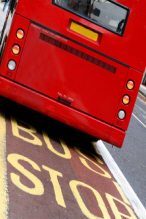TfL and roads in the capital
 A High Court judge has ruled on a dispute over the extent of Transport for London’s interests in London’s roads. Charles Banner reports on the outcome.
A High Court judge has ruled on a dispute over the extent of Transport for London’s interests in London’s roads. Charles Banner reports on the outcome.
The case of London Borough of Southwark v. Transport for London [2015] EWHC 3448 (Ch) was a dispute between two London boroughs, Southwark LBC and the City of London (“the Councils”), and Transport for London concerning the vertical and horizontal extent of the interests in ‘Greater London Authority roads’ previously owned by London boroughs that were transferred to Transport for London upon its establishment in 2000.
The dispute turned upon the interpretation of Article 2(1)(a) and Article 2(1)(b)(i) of the GLA Roads and Side Roads (Transfer of Property etc) Order 2000. Transport for London contended that these provisions had transferred to it all the land which the Councils had acquired for or appropriated to highway purposes, which would ordinarily be the whole of their freehold in the GLA roads vertically and horizontally. The Councils contended that Transport for London only took the surface of the GLA roads, together which such other interest as were necessary or reasonably required for the function of the road in question.
As required by the legislation, the dispute was resolved by arbitration, the arbitrator (John Male QC) finding in Transport for London’s favour on these issues. The Councils appealed to the High Court under s.69 of the Arbitration Act 1996, permission to appeal having been granted by Morgan J.
Dismissing the appeal, Mann J. held, amongst other things:
- At the heart of the Councils’ case was the proposition that the word “highway” in Article 2(1)(a) of the 2000 Order should be given the same interpretation as under the Highways Act 1980, where it had the more limited meaning that the Councils contended for. That proposition was misplaced. The Highways Act 1980 and its predecessor legislation did not define the term “highway” and the judgment of Mr Kim Lewison QC (as he then was) in Secretary of State v. Baylis (Gloucester) Ltd(2000) 80 P.&C.R. 324 did not support the narrow meaning contended for by the Councils.
- The purpose of the 2000 Order was that Transport for London should step into the London Boroughs’ shoes in relation to the GLA roads. That purpose supported Transport for London’s position as to the extent of ownership transferred.
- The legislative history relating to the abolition of the previous Greater London Council in the 1980s did not assist the Councils.
Having delivered judgment, Mann J. granted permission to appeal to the Court of Appeal on the basis that the case concerned a point of law of general public importance.
Charles Banner is a barrister at Landmark Chambers. Together with Tim Morshead QC, he appeared for Transport for London, instructed by Wragge Lawrence Graham LLP.
David Elvin QC and Richard Moules, also of Landmark Chambers, appeared for the London Borough of Southwark and the City of London, instructed by Dentons LLP.
